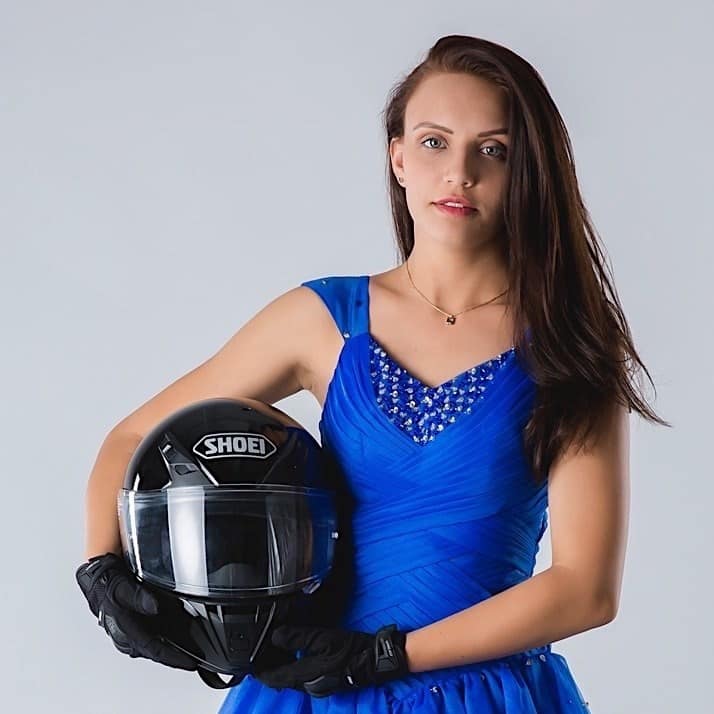[ad_1]
Even onstage, performing at Carnegie Hall, she felt pulled somewhere else.
“It was quite a distinct moment,” said Embry-Riddle Aeronautical University student Jennea Katic, remembering the day. She was 14 years old, singing “Part of Your World” from “The Little Mermaid.”
“That whole song is about longing and dreaming of doing something else, taking that step forward.” After the Carnegie Hall performance, moving forward is exactly what she did. Today, she is president of Embry-Riddle’s Formula SAE team, ERAU Motorsports — which builds fuel-efficient racecars from scratch. She also has a side job as a data engineering intern for the Jr III Racing team.
Katic, who was born in South Africa, was committed to becoming a world-class vocalist, and she was well on her way. She had competed against 200 singers from across the world for the chance to sing at Carnegie Hall, but her voice was starting to strain and her grades were starting to slip. So, she made a promise to herself that, whether or not she earned a ticket to the big stage, this would be her last voice competition.
“I’ve always wanted to be the best and put myself in strenuous competitions, never stay in the same area,” said Katic.
That instinct to evolve eventually led her to Embry-Riddle, where she is currently in her fourth year of a Mechanical Engineering degree program.
What does engineering have to do with theater? For Katic, the answer is discipline.
“You have to prepare, rehearse, practice,” she said, noting how math is used in various song structures and art movements. “Math has a very interesting way of traveling through those two very different areas: units of music, units in the scientific field. It’s weird because they shouldn’t correlate, but they do. It has helped me.”
In addition to her role with Embry-Riddle’s Formula SAE team, Katic also currently works as a data engineering intern for the Jr III Racing team. She travels to races around the country to monitor racecars’ “vitals” — their engine and oil temperature, water pressure, fuel consumption per lap, etc. — then make improvement recommendations to drivers.
“Each test is basically a competition,” Katic said. “I’ve committed fully to this field.”

Jennea Katic fuses her love of both musical theater and Mechanical Engineering, using lessons learned
from her days as an international voice competitor to fuel new dreams of making an impact in the world
of motorsports. (Photo: Jennea Katic)
Coming to America
With her family, Katic emigrated to the United States when she was 8, but it wasn’t until middle school that she became aware of the ways in which she was different. Her accent was different, for instance. While her friends got new stuff, her family made old things last. While her friends had fun on weekends, she worked in her parents’ laundromat, folding clothes.
“I was raised by my parents to think, if you’re going to do something, be the best,” she said. Initially, that fueled her passion for musical theater, which then extended to engineering through high school STEAM (Science, Technology, Engineering, the Arts, and Mathematics) programs.
Not long after high school, she landed an internship at Lockheed Martin, which made sense, given her history working in her dad’s now-30-year-old automotive business.
“I developed a love of being hands-on, building, manufacturing,” she said, noting that her father taught her how to build engine mounts, assemble vehicle bodies and design electric car battery packs, among other things. “That experience paved the way for me to pursue a career in Mechanical Engineering.”
She isn’t sure yet if she’ll go to work for the family business or dive deeper into the world of data and race engineering after graduation, but regardless, she’s determined to make an impact in the industry — as well as maintain momentum in her emigration story, which took another step forward last year, when she secured her U.S. citizenship.
“My parents made such a big move to bring me here,” she said. “I can’t thank them enough, and I don’t want to let them down.”
Building Cars and Careers
Now, graduation is in sight for Katic.
“I would say the employment rate for ERAU Motorsports students is over 99%,” said Dr. Gaetano Sterlacci, assistant professor of Mechanical Engineering and the club’s faculty advisor.
The team’s visibility within the industry plays a big part in that statistic. Members of ERAU Motorsports gain specialized experience — through car design, fabrication, data analysis and business management — and they regularly interface with real-world companies. As president of the organization, Katic embodies its mission.
According to Dr. Rafael Rodriguez, former faculty advisor of Embry-Riddle’s Formula SAE team and current associate professor and chair of Mechanical Engineering, Katic’s preference for hands-on learning is not uncommon for Embry-Riddle students. The university prides itself on helping students like Katic build occupational skills that are directly transferable to careers after graduation.
“In the Mechanical Engineering Department, we use the phrase ‘experiential learning’ because students like Jeanne have the opportunity to practice engineering before leaving the school to work in the field,” he said. “They get to experience the full product-development process, from requirements, ideation, design, manufacturing, assembly, testing, failure, redesign, back to testing, until a product is completed.
Katic knows that songbooks can’t teach her to sing, any better than textbooks can teach her how to hear to the music in machinery. Some things, she has found, one can only learn by doing.
[ad_2]
Source link
